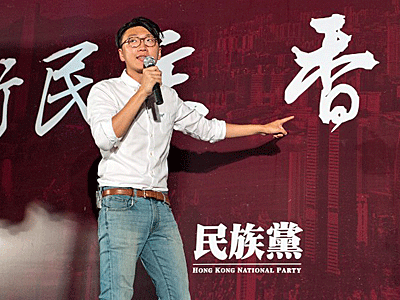




Pan-democratic parties in Hong Kong appeared to be falling behind ahead of elections to the city's Legislative Council (LegCo) on Saturday as a number of candidates effectively pulled out of the race to avoid splitting the vote.
Labour Party candidate Suzanne Wu announced she was suspending her campaign for a seat in the Kowloon East geographical constituency, while independents Paul Zimmerman and Andy Chui said their supporters should vote for other democrats instead.
Zimmerman called on his supporters to vote for democrats who "are almost in" to increase their overall number in LegCo.
Two other pan-democratic candidates for city-wide seats, Sumly Chan for the Civic Party and Kalvin Ho for the Association for Democracy and People's Livelihood (ADPL) also announced their withdrawal.
Political analysts said the withdrawals were likely a tactical maneuver aimed at maximizing seats for pan-democratic candidates in LegCo.
The withdrawals—which cannot be formalized at this stage of the election—came after Liberal Party candidate Ken Chow suspended his campaign, saying he had received threats.
One seat short
Meanwhile, a public opinion survey carried out by the University of Hong Kong on Friday found the opposition camp would likely fall one seat short of winning a majority of the 40 directly elected seats in the 70-seat legislature.
Sung Lap Kung, lecturer in politics at Hong Kong's City University, said a failure to secure a majority in Saturday's poll would have a huge impact on the political landscape in the former British colony.
"If the results really do turn out that way, then the impact will be huge," Sung told RFA.
"In the past, they were able to ensure that a lot of legislation from the government didn't pass, because they held a crucial minority in opposition," he said.
"If they lose it in this election, they'll have to rely far more on filibustering and vote-gathering activity if they are to provide a check and balance to the administration," he said.
Pollster Joseph Cheng said that a swing of just two percent will alter the result significantly, government broadcaster RTHK reported.
A simple majority for the pro-establishment camp in geographical constituencies would make it easier for the government to pass controversial bills, including national security legislation that opponents fear could be used to muzzle peaceful dissent.

Saturday's elections come amid a city-wide row over discussions about independence for the former British colony, which the ruling Chinese Communist Party and the current chief executive Leung Chun-ying say is an illegal concept that should be banned from public discourse.
Critics have accused officials of whipping up debate on the topic to boost their standing in Beijing by suppressing it.
Authorities in Hong Kong have barred several candidates from taking part in this year's LegCo election, citing the candidates' support for independence.
Election officials rejected the candidacy of Edward Leung of the Hong Kong Indigenous political group and five other candidates they said supported independence for Hong Kong.
Edward Leung had already received more than 60,000 votes in a February by-election, and his candidacy was seen as representative of a groundswell of support for independence, particularly among the city’s younger voters.
The decision by Hong Kong’s Electoral Affairs Commission came after Edward Leung had denied supporting independence, signed a controversial new declaration recognizing his home city as “an inalienable part of China,” and distanced himself from previous comments that were widely reported in the local media.
Edward Leung's replacement Baggio Leung told RFA on Friday that Chinese officials have interfered in these elections on an unprecedented scale, in spite of promising Hong Kong a "high degree of autonomy" under the terms of its 1997 handover to China.
"Hong Kong elections are clearly an internal political affair," Baggio Leung said. "This is clearly in breach of the one country, two systems policy, the Basic Law and the [1984] Sino-British Joint Declaration."
"This is also the reason why 17 percent of Hong Kong people are now in favor of independence," he said.
Pan-democratic camp
Chung Kim-wah, assistant professor of applied social science at the Hong Kong Polytechnic University, said the polls are showing declining support for pan-democratic politicians.
"The trend is very clear, so candidates whose support is less strong are withdrawing so as to concentrate the democratic vote behind a few candidates," Chung said. "That's the only way they have any hope of preserving their slight majority."
Chung said the move wasn't surprising.
"It will have the effect of galvanizing the pan-democratic camp and showing how unified they are, which in turn could attract more voters," he said.
The survey of more than 5,000 respondents suggest that pan-democrats will take 17 of 35 seats in the geographical constituencies.
However, about a quarter of poll respondents said they were undecided.
Saturday's poll will return LegCo members to 35 directly elected seats based on five geographical constituencies, with a further five "superseats" returned by city-wide vote.
The remaining 30 members are chosen via trade and profession-based "functional constituencies."
A two-thirds majority is needed in LegCo for any constitutional change to pass.
Reported by Lam Kwok-lap for RFA's Cantonese Service. Translated and written in English by Luisetta Mudie.